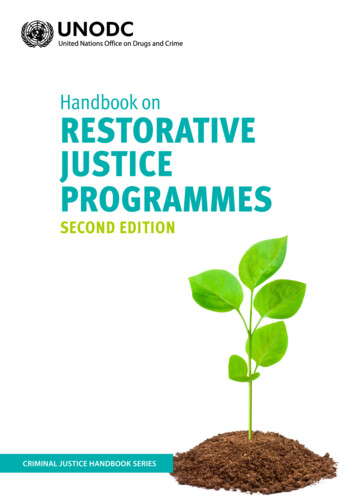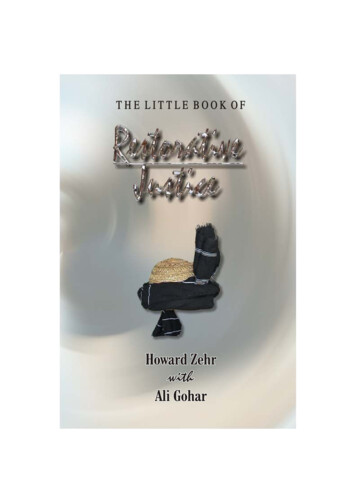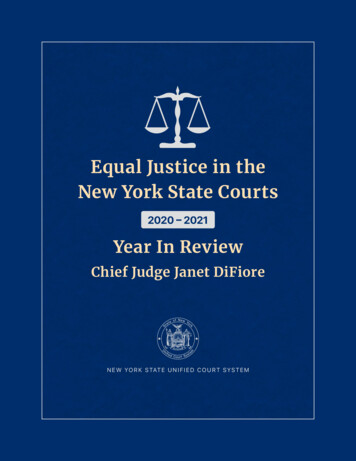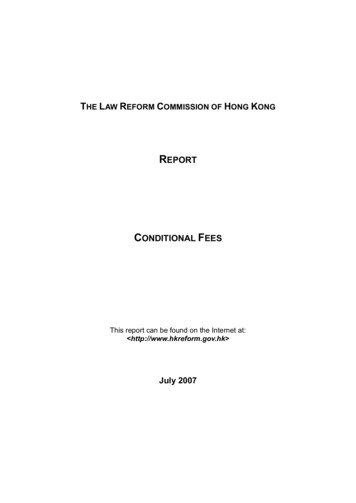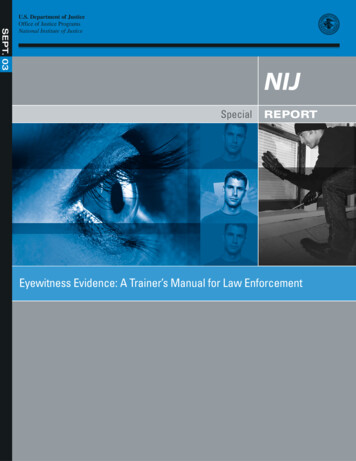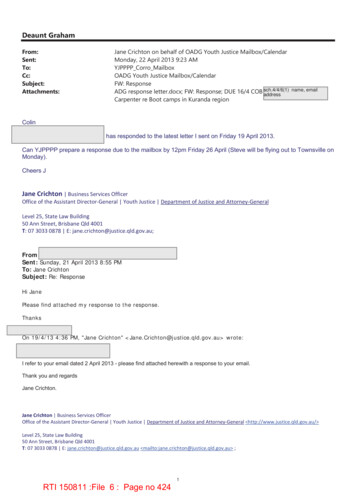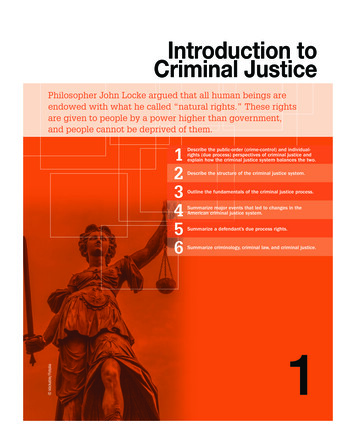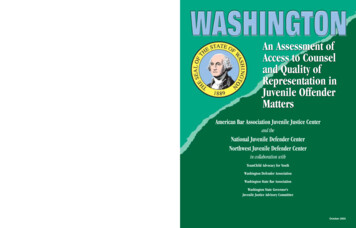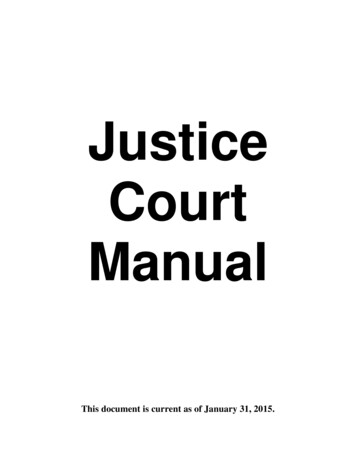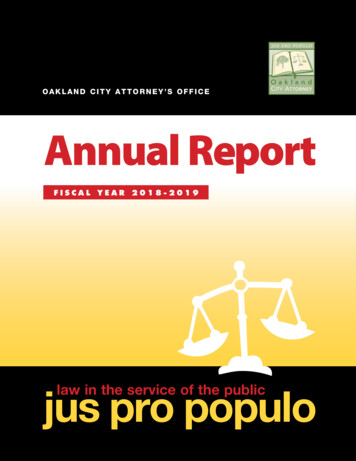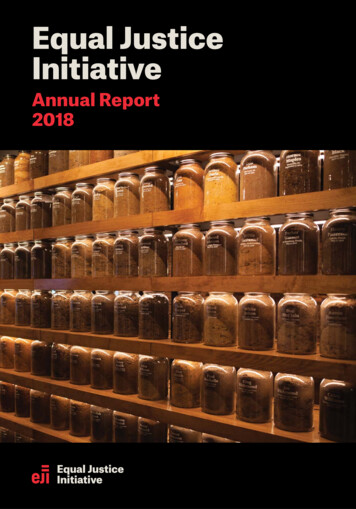
Transcription
Equal JusticeInitiativeAnnual Report20181
Steve Schapiro/Getty ImagesCover: Human Pictures2
Your support makesour work possible.The Equal Justice Initiative is a private,nonprofit law organization that has provided legal services to the poor, incarcerated, and condemned for nearly 30years. From our office in Montgomery,Alabama, we have challenged massincarceration, excessive punishment,and the abuse of children, people withdisabilities, and the indigent in America’s criminal justice system. We havemade eliminating racial bias and discrimination against the poor a centralfeature of our work and have won majorlegal reforms and secured relief, release,or reduced sentences for over 140 condemned people on death row. Our advocacy and litigation to ban mandatorylife-imprisonment-without-parole sentences for children resulted in landmarkrulings by the United States SupremeCourt that have impacted thousands ofcases.Over the last several years, we haveengaged in new work to challenge thehistory of racial injustice in America withresearch, reports, community educationefforts, advocacy, and public markers.This year we opened two new nationalinstitutions that have drawn international praise. The Legacy Museum: FromEnslavement to Mass Incarcerationand the National Memorial for Peaceand Justice represent years of work byEJI to create new narrative spaces in theUnited States that document our nation’shistory of racial inequality. The sites havealready attracted tens of thousands ofvisitors. The opening of our sites in April2018 was accompanied by three days ofevents, talks, lectures, and performancesthat brought together an amazing arrayof voices and continue to have a greatimpact on the national discourse aboutrace, poverty, and criminal justice reform.EJI’s staff and work have grown dramatically in the last year. Our work is the product of thousands of people like you whosupport us, donate to us, encourage us,and stand with us as we try to create ajust nation more committed to fairnessand equality. We are grateful for your support and thrilled to share this year’s report.Bryan Stevenson, Director3
The LegacyMuseum:From Enslavement toMass Incarceration4This year, EJI created and opened a newnational institution. The Legacy Museum: From Enslavement to Mass Incarceration is an 11,000-square-foot spacelocated on the site of a warehouse thatonce confined enslaved black peopleawaiting sale. A physical site and anoutreach program, the museum is designed as an engine for education aboutthe legacy of racial inequality. Exhibitsfeature narrative content and videogra-
Human Picturesphy, the nation’s most comprehensivecollection of data on lynching, courageous testimonies from former and current EJI clients, and new technology thatbrings to life previously unseen archivalinformation about the domestic slavetrade. Together, these materials and thevisitors who engage with them transform the site from a space of historicaltrauma to one of truth and healing.We believe that telling the truth aboutthe slave trade, racial terror and lynching, Jim Crow segregation, and mass incarceration is critical to overcoming thedivision and conflict that have grownfrom centuries of denial and avoidance.EJI is committed to engaging communities in honest reflection that can helpour nation respond more effectively toour history of racial inequality.5
The NationalMemorial forPeace andJusticeThe National Memorial for Peace andJustice is the nation’s first comprehensive memorial dedicated to thousandsof African American victims of racialterror lynchings between 1877 and 1950.The National Memorial opened in April2018 in Montgomery, Alabama.The National Memorial is dedicated toeducating visitors about how two centuries of enslavement of black people6
One of the mostpowerful andeffective newmemorials createdin a generation.—The Washington PostThere is nothinglike it in thecountry.—The New York TimesThe single greatestwork of Americanarchitecture of the21st century.—The Dallas Morning News Alan Karchmer for EJIevolved into decades of terror and violence following the collapse of Reconstruction. It details the violence andterror that forced millions of AfricanAmericans to flee the South and thecontinuing legacy of that terror throughthe 20th century until today.Using investigative research, sculpture, art, design, literature, and poetry,EJI created the National Memorial asa space for everyone to confront ournation’s history of racial inequality withhope that a future of peace and justicecan be achieved. The National Memorialis a beginning—an opportunity for communities across the country to claimtheir monuments, to confront the pastwith courage, and to begin a hopefulfuture in which truth leads to repair,restoration, and reconciliation.7
Death Penalty8EJI continues to provide direct legal representation to over 100 condemned menand women on Alabama’s death row. Wealso provide assistance, consulting, andcase management to dozens more deathrow prisoners in the state. This year, wepersuaded the United States SupremeCourt to review an important constitutional issue concerning the executionof people with dementia. In Madison v.Alabama, EJI won a stay of executionfor a man suffering from dementia after33 years on Alabama’s death row. EJI iscommitted to protecting people who areseverely disabled or incompetent fromthe cruelty of an execution.
We are one of the nation’s primaryresources for education, training, andinnovation in the death penalty area andin 2018 we produced a new capital defense manual for lawyers representingpeople accused of capital crimes. EJI’sAlabama Capital Defense Trial Manualcontains nearly 500 pages of instruction,guidance, and analysis to assist defenselawyers handling death penalty cases.EJI also provides dozens of sample motions and pleadings for capital defenselawyers. EJI staff routinely present attraining conferences and convenings oncapital representation.Our public education work also reachednew levels in 2018 with the release of EJICommunity Educator and former deathrow prisoner Anthony Ray Hinton’s newbook, The Sun Does Shine. The bookdocuments Mr. Hinton’s 30 years on Alabama’s death row for a crime he did notcommit. His account of his ordeal andEJI’s effort to win his freedom has drawnnational attention and became a NewYork Times Best Seller in June after itwas selected by Oprah Winfrey’s BookClub. Ms. Winfrey described the bookas one of the most moving memoirsshe has ever read. Mr. Hinton has spoken all over the country and addressedthousands of people at EJI as part of ourcommunity education efforts.CBS This MorningHe is a remarkablestoryteller. You willbe swept away intothis unbelievable,dramatic true story.—Oprah WinfreyAssociated Press9
ChildrenProsecutedas Adults10
In 2018, EJI actively provided legalrepresentation to scores of people whowere condemned to die in prison forcrimes they committed when they werechildren. In Pennsylvania, we won areduced sentence for Trina Garnett, whowas 14 when she sentenced to die inprison for a felony murder. Ms. Garnetthas been incarcerated for 42 years. InNebraska, we won a reduced sentencefor Darren McCracken, who was alsosentenced to life imprisonment withoutparole when he was 14.In Alabama, we have now won reducedsentences for 40 juveniles originallysentenced to life imprisonment withoutparole. In Louisiana, during the last year,we secured the release of three morepeople who had been condemned to diein prison.Joe Sullivan was sentenced to life imprisonment without parole for a nonhomicide crime at age 13 that we do notbelieve he committed. Joe’s case wasthe first case we took to the UnitedStates Supreme Court, which resultedin a 2010 ban on life-without-parolesentences for all children convicted ofnonhomicide offenses. This year, Joewas released from a Florida prison after25 years of confinement.Robert Caston (left) and August Williams were sentencedto die in prison in Louisiana as teenagers. Mr. Caston wasone of the first clients to win release after the SupremeCourt’s decision in Graham v. Florida. EJI won Mr. Williams’s release in 2017 after 49 years in prison.Borlis Wilson was sentenced to diein prison for a juvenile nonhomicidecrime. EJI won his release in 2017 afterover 35 years at Louisiana’s notoriousAngola prison.Willie Leason spent over 50 years atAngola prison after being convicted ofa nonhomicide offense when he was 17.He celebrated the two-year anniversaryof his release this summer.11
Criminal JusticeReformEJI is actively pursuing relief from America’s tragic over-incarceration, whichhas made us the most punitive nationon Earth. EJI works to obtain parolefor people who have been incarceratedfor decades. We educate policymakersabout best practices and the need forsentencing reform and alternatives toincarceration. We advise courts and oth-er decision-makers on ways to reducereliance on jails and prisons. We litigateon behalf of individuals to challenge excessive punishment and harsh sentences. We believe that there are thousandsof people currently incarcerated who arenot a threat to public safety and shouldbe released.Orange is the New Black author Piper Kerman with Anthony Ray Hinton, who spent 30 years on deathrow for a crime he did not commit, and Steve Bright, President of the Southern Center for HumanRights, discussing criminal justice reform at the Peace and Justice Summit in April.Bryan Stevenson and John Legend speak at a community meeting in Los Angeles about the need forcriminal justice reform. Hadas for Into Action/Los Angeles Review of Books12
Re-EntryServicesEJI provides re-entry services to clientscoming out of prison by providing arange of support. Job training, education, housing, transportation assistance,support services to obtain benefits, lifeskills coaching, counseling, and therapyare among the services we provide toclients who become part of our Post-Release Education and Preparation program. PREP has served scores of formerly incarcerated people over the last 12years and has a near-perfect record ofpreventing clients from re-offending.Joe Sullivan was 13 when he was wrongly accused of asexual assault in Florida. He was sentenced to life imprisonment without parole, becoming one of the youngest children condemned to die in prison in America. In2009, EJI took Joe’s case to the United States SupremeCourt and ultimately won a ban on sentencing childrenconvicted of nonhomicide offenses to life without parole.This year, after 25 years of incarceration, Joe Sullivanwas released and admitted into EJI’s re-entry program,which provides intensive assistance to people comingout of jail or prison who are especially vulnerable.EJI provides a range of services to formerly incarcerated clients, including residential assistance, employment, job training, mental health services, life skills education, benefits assistance, transportation,medical assistance, and rigorous counseling and support services.13
PrisonConditions14
With over two million people in jails andprisons in America, conditions of confinement in many states have becomeabusive, violent, dangerous, and unconstitutional. EJI challenges inhumaneprison conditions and abusive treatmentof incarcerated people through education, litigation, and advocacy. This pastyear, we settled a class action lawsuitagainst one of Alabama’s most dangerous prisons, which has one of thehighest homicide rates in the nation. Wehave filed dozens of complaints with theJustice Department and state and localofficials documenting abuse, violence,and unconstitutional conditions. A 2018documentary EJI prepared about conditions of confinement has been seen bythousands of visitors to our new LegacyMuseum and has become a powerfultool for educating people about theneed to improve prison conditions.Prison overcrowding in some states isnear 200 percent capacity, which hasresulted in increased violence, suicide,and corruption. Getty/Los Angeles Times15
John LegendFrom Left Jacqueline Woodson, Common, Senator Cory Booker, Brittany PacknettMamie Kirkland, a 109-year-old survivor of a lynching in Mississippi is honored.Peace andJusticeOpeningApril 26—27, 2018Montgomery, Alabama16Patti LaBelleIn April, we celebrated the opening ofEJI’s new Legacy Museum and NationalMemorial. Over 25,000 people came toMontgomery to participate in two days ofexciting talks, lectures, performances, anda rousing final concert at the MontgomeryRiverwalk, featuring performances from TheRoots, Dave Matthews, Usher, Kirk Franklin, Brittany Howard, Common, Jon Batiste,Kirk Franklin, and an unforgettable finaleby Stevie Wonder. Before the concert,thousands of people packed the Montgomery Performing Arts Center to hearfrom Michelle Alexander, Sherrilyn Ifill,
From Left Elizabeth Alexander, Anna Deavere Smith, Ava DuVernayRev. Dr. William BarberAndra DayAlfre WoodardThe Roots and entire line-up joined Stevie Wonder for the finale at the Peace and Justice Concert. Taylor HillJelani Cobb, Rev. Dr. William Barber, GloriaSteinem, Marian Wright Edelman, MichelMartin, Ava DuVernay, Elizabeth Alexander,Anna Deavere Smith, Former Vice President Al Gore, Piper Kerman, Steve Bright,Anthony Ray Hinton, Senator Cory Booker,Brittany Packnett, Dr. Howard Stevenson,Dr. Margaret Beale Spencer, Dr. WalterGilliam, Catherine Flowers, JacquelineWoodson, and Common.The pre-opening featured remarks fromDarren Walker, Kim Taylor-Thompson,Laurene Powell Jobs, and Michel Martinand performances by John Legend, AndraDay, Brandie Sutton, and BeBe Winans.Over 10,000 people attended our openingceremony, where Congressman John Lewisspoke and we honored civil rights pioneers,including Fred Gray, Mamie Kirkland, Claudette Colvin, Ruby Sales, Dr. C.T. Vivian,Elizabeth Eckford, Rev. Jesse Jackson, Congressman John Lewis, Mary Louise Ware,Bernard Lafayette, Dr. Regina Benjamin,and Elaine Jones. The ceremony includedperformances by Sweet Honey in the Rock,Ailey II, and Patti LaBelle.Photos by Gary Hunter, unless otherwise noted17
CommunityRemembranceProjectEJI has continued to erect markers atlynching sites across the country duringthe last year. In several new states, EJIstaff worked with community leadersto honor African Americans who werevictims of racial terror lynching. Ourcommunity remembrance efforts haveincreased dramatically since the openingof the new memorial. We have alreadyheard from close to 300 counties aboutcollecting their monuments as part ofour ongoing effort to engage communities in important conversations aboutour nation’s history of racial inequality.EJI has organized dozens of events where community members honor victims of racial terror lynching by collecting soil fromlynching sites and erecting markers that document the history of lynching. Opposite Kiara Boone from EJI unveils a marker inSelma, Alabama, with civil rights legend Dr. Bernard Lafayette, who worked with Dr. Martin Luther King Jr. on the 1968 PoorPeople’s Campaign.18
19
PublicEducation
In the last year, EJI has increased itspublic education work dramatically.Staff have done hundreds of presentations for schools, faith communities,and policymakers about the need forcriminal justice reform. We also havebeen very actively educating communities and the nation about the needto confront our nation’s history of racial inequality. Our reports on slavery,lynching, and segregation have beendistributed to thousands. We have twonew websites on lynching and segregation that present unique information tousers all over the world and we createda curriculum for teachers and educators to use in the classroom. Our newmuseum and memorial have attractedover 200,000 visitors in the first fourmonths of operation. We have receivedextremely favorable coverage of bothsites worldwide since our opening,including powerful reviews in The NewYork Times, The Washington Post, CNN,CBS’s “60 Minutes,” and TIME Magazine. We are committed to changingthe narrative in America about over-incarceration, excessive punishment, andracial and economic injustice.Thousands gathered for the opening of EJI’s NationalMemorial for Peace and Justice. A faith dedication was heldat the site on April 26, 2018. Human Pictures21
Getty/Corbis Premium HistoricalSegregation in America is a new reportand companion website that documents how millions of white Americansjoined a mass movement of committed,unwavering, and often violent opposition to the Civil Rights Movement. EJIbelieves that understanding this massopposition to racial equality, integration,and civil rights is central to confronting the continuing challenges of racialinequality today.Opposite EJI’s new memorial and museum staff gather fortraining and preparation to open our new sites in April 2018.22
23
EJI StaffExecutive Director Bryan Stevenson and Deputy Director Randy Susskind meet with staff. DiAnna Paulk for EJIEJI’s staff has grown dramatically in thelast year. The addition of over 40 newmuseum and memorial staff and the expansion of EJI’s legal work has broughta group of extremely talented anddedicated people to our team. Our lawfellowships, justice fellowships, racialjustice internships, social work fellowships, and a range of other programshave attracted hundreds of applicantsto help continue EJI’s important work.24From Left Senior Attorney Jennifer Taylor with EJI staffGabrielle Daniels, Kiara Boone, and Jonathan Kubakundimana
Site Manager Josh CannonCommunity Educator Anthony Ray Hinton and Deputy Director Tera DuVernaySenior Attorney Sia SannehLaw Fellow Evan MilliganFrom Left EJI staff Jonathan Kubakundimana and ElliotSpillers (Florian Koenigsberger)EJI’s new Gift Shop opened at 121 Coosa Street, next to theLegacy Museum.25
In April 2018, EJI was featured on “60 Minutes” in a segment hosted by Oprah Winfrey, who posed with staff. Keith WalkerClockwise from Left EJI staff Menna Elsayed, Kari Nelson, Elliot Spillers, ChrisKeough, Eugene Harris, and Miriam Ashley-Smoke2018 student interns26
EJI has an ambitious plan to add to ourrenowned museum and memorial a newCenter for Peace and Justice, which weplan to open in 2019. We hope to raise 10 million in campaign revenue for thenew spaces and sites and expect to havean operational budget of 13 million inthe coming fiscal year. We are gratefulfor the support of so many people andare proud that the overwhelming majority of our support comes from individual donors. EJI devotes 89 percent ofrevenue to program services, with theremaining support going to administration and development. EJI is a top ratedhuman and civil rights charity by CharityNavigator, earning a perfect score forFinancial Health and Accountability &Transparency.We are a nonprofit 501(c)(3) organization. All donations are tax deductible.We greatly appreciate your support andcontributions to our work.27
28 2018 by Equal Justice Initiative. All rights reserved. No part of this publicationmay be reproduced, modified, or distributed in any form or by any electronic or mechanical means without express prior written permission of Equal Justice Initiative.
book, The Sun Does Shine. The book documents Mr. Hinton's 30 years on Ala-bama's death row for a crime he did not commit. His account of his ordeal and EJI's effort to win his freedom has drawn national attention and became a New York Times Best Seller in June after it was selected by Oprah Winfrey's Book Club. Ms. Winfrey described the .
